
Find Help
More Items From Ergsy search
-

Are there home remedies for chickenpox?
Relevance: 100%
-

Are there home remedies for psoriasis?
Relevance: 60%
-

What is the treatment for chickenpox?
Relevance: 58%
-

Are there any home remedies for impetigo?
Relevance: 56%
-
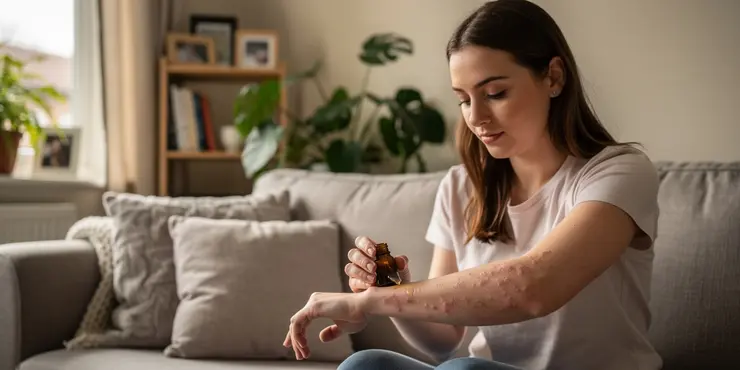
Are there any home remedies for eczema?
Relevance: 51%
-

Is chickenpox contagious?
Relevance: 51%
-
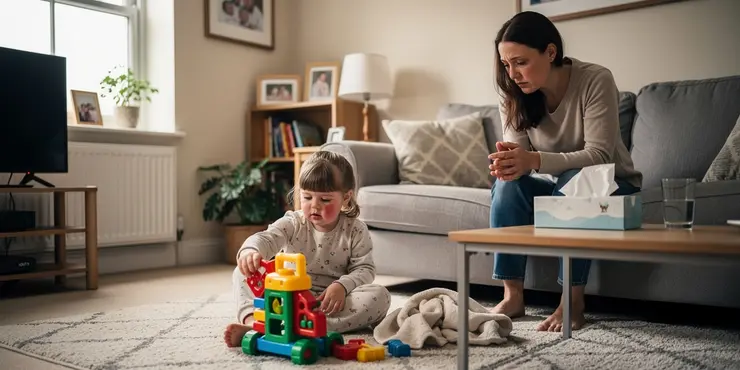
What is Chickenpox?
Relevance: 49%
-
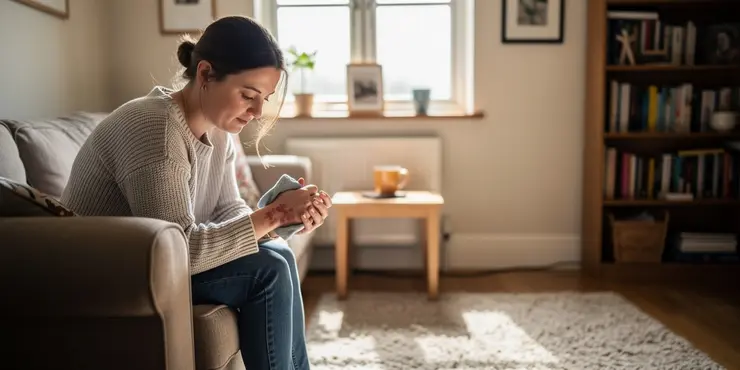
Are there any home remedies for nettle rash?
Relevance: 47%
-

Can chickenpox be prevented?
Relevance: 46%
-

How is chickenpox spread?
Relevance: 46%
-

Can adults get chickenpox?
Relevance: 44%
-

What are the complications of chickenpox?
Relevance: 44%
-

What are the symptoms of chickenpox?
Relevance: 44%
-

Common health questions about chickenpox | NHS
Relevance: 43%
-

Should I get the chickenpox vaccine?
Relevance: 42%
-

How long does chickenpox affect a child?
Relevance: 41%
-

How to Keep a Child With Chickenpox Comfortable
Relevance: 41%
-

Who should get the chickenpox vaccine?
Relevance: 41%
-
Can pregnant women get chickenpox?
Relevance: 41%
-

Can the shingles vaccine cause chickenpox?
Relevance: 40%
-

Can the shingles vaccine cause chickenpox?
Relevance: 39%
-

Is it safe to use aspirin to treat chickenpox symptoms?
Relevance: 39%
-

Can you get chickenpox more than once?
Relevance: 38%
-
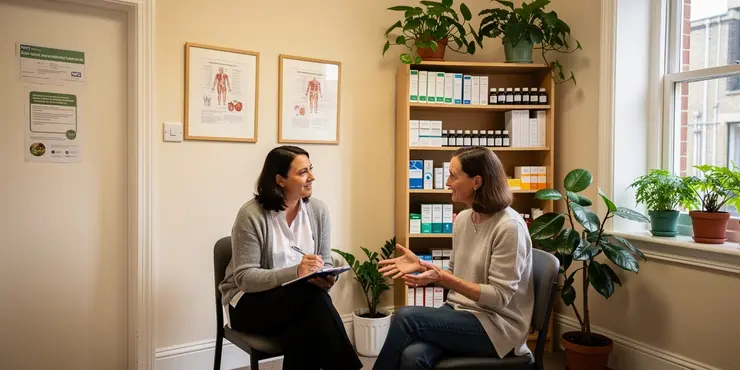
Who can prescribe homeopathic remedies?
Relevance: 37%
-

Health Officials Warn Against 'DIY' Health Remedies Amid Supply Chain Issues
Relevance: 36%
-
Are there natural remedies for menopause masking?
Relevance: 34%
-
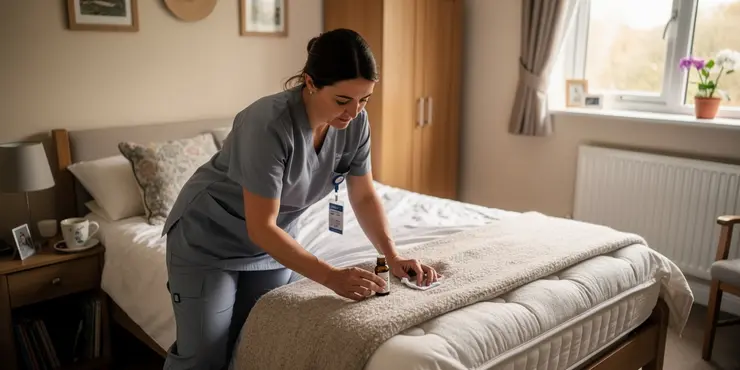
Are there any natural remedies for bed bugs?
Relevance: 34%
-

How can I treat a cold at home?
Relevance: 34%
-

How long is the incubation period for chickenpox?
Relevance: 29%
-

How are care homes different from nursing homes?
Relevance: 25%
-

What are Care Homes?
Relevance: 25%
-

How to care for someone with chicken pox
Relevance: 24%
-

Fire Safety At Home
Relevance: 24%
-

Why might there be more spiders in the home during autumn?
Relevance: 23%
-

Are there different types of care homes?
Relevance: 23%
-
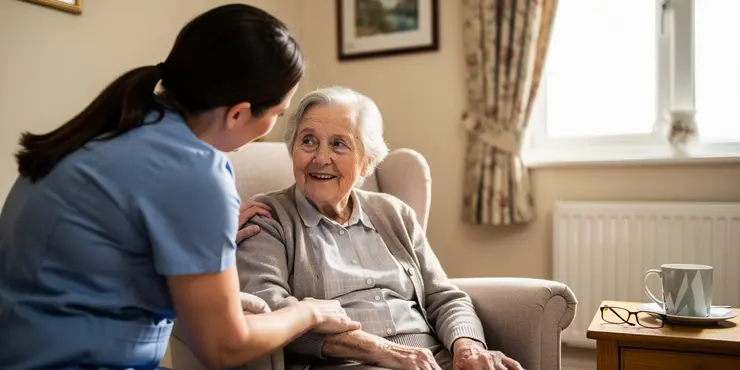
The role of residential and nursing homes
Relevance: 23%
-
Home Haemodialysis - Donna's story
Relevance: 23%
-

What is the Warm Home Discount?
Relevance: 23%
-

The role of residential & nursing homes
Relevance: 23%
-

Is the Warm Home Discount a loan?
Relevance: 23%
Understanding Chickenpox
Chickenpox, also known as varicella, is a highly contagious disease caused by the varicella-zoster virus. It is commonly characterized by an itchy, blister-like rash, fever, and fatigue. While vaccination has significantly reduced the incidence of chickenpox, it still occurs, especially in children. Most cases resolve on their own, but the symptoms can cause significant discomfort, prompting many to seek home remedies for relief.
Comfort Measures for Chickenpox
There are several home remedies to help alleviate the discomfort associated with chickenpox. Maintaining skin comfort is essential. A popular method in the UK is taking cool baths with added colloidal oatmeal. Colloidal oatmeal is known for its soothing and anti-inflammatory properties, which can help calm the itching caused by the rash. Ensure that baths are lukewarm rather than hot, as hot water can exacerbate itching.
In addition to oatmeal baths, calamine lotion is widely used to relieve itching. Applying calamine lotion to the affected areas can provide a cooling sensation, which helps reduce discomfort. It is important to avoid use over the eyes or on mucous membranes.
Nutritional Support and Hydration
Staying hydrated is crucial when managing chickenpox. Fever and infection can lead to dehydration, so encouraging regular fluid intake, such as water and herbal teas, is beneficial. In the UK, chamomile or peppermint tea might be chosen for their soothing effects.
Eating a balanced diet may support immunity and recovery. Soft, bland foods are often best tolerated if mouth sores develop. Foods rich in vitamins C and E, such as strawberries and almonds, are thought to support healing, though scientific backing specifically for chickenpox is limited.
Clothing and Environment
Comfortable clothing can help minimize irritation. Loose, lightweight clothing made of soft fabrics like cotton is ideal, as it both absorbs sweat and allows the skin to breathe. Keeping fingernails trimmed short can prevent skin damage from scratching, which reduces the risk of secondary infections.
Ensuring the sleeping environment is comfortable is beneficial as well. Keeping the room cool, using a fan or air conditioning, can help reduce itchiness during sleep, aiding in restful recovery.
When to Seek Medical Advice
While home remedies can provide comfort, it is important to recognize when professional medical advice is needed. If symptoms appear severe, such as persistent high fever, breathing difficulties, or if there are signs of skin infection, contact a healthcare provider immediately. Additionally, individuals at risk of complications, such as pregnant women, newborns, and individuals with weakened immune systems, should seek medical advice promptly.
In conclusion, home remedies like oatmeal baths, calamine lotion, proper hydration, and dietary choices can help manage chickenpox symptoms at home in the UK setting. However, monitoring symptoms and knowing when to seek medical attention is crucial for safe recovery.
Understanding Chickenpox
Chickenpox is a disease that spreads very easily. It is caused by a virus called varicella-zoster virus. People with chickenpox get an itchy rash with blisters. They might also have a fever and feel tired. Vaccines have helped stop many people from getting chickenpox, but some still catch it, especially kids. Most people get better on their own, but chickenpox can be very uncomfortable. Many people look for ways to feel better at home.
Ways to Feel Better with Chickenpox
There are things you can do at home to help feel better from chickenpox. Taking care of your skin is important. In the UK, some people take cool baths with a special kind of oatmeal called colloidal oatmeal. This can help stop the skin from itching. Make sure the bath is not too hot, as hot water can make itching worse.
Many people also use calamine lotion to help with itching. Put the lotion on the itchy spots. It feels cool and helps stop itching. Just be careful not to put it near your eyes or mouth.
Healthy Eating and Drinking
Drinking enough water is very important when you have chickenpox because you can get dehydrated from fever. Drink water and maybe some herbal teas. In the UK, some people like chamomile or peppermint tea because they help you feel calm.
Eating healthy food can help your body get better. Soft foods might be best if you have sore spots in your mouth. Foods with vitamins, like strawberries and almonds, can help you heal, but don't worry too much; just eat a variety of foods.
Clothing and Environment
Wearing comfortable clothes can help stop the skin from getting more irritated. Wear clothes that are loose and made of soft materials like cotton, so your skin can breathe. Keep your nails short so you don’t scratch too much and hurt your skin, which can cause infections.
Make sure your bedroom is comfy for sleeping. Keep the room cool, maybe use a fan, so you don’t itch too much at night and can sleep better.
When to Get Medical Help
Home remedies can help, but sometimes you need to see a doctor. If you have very high fever, trouble breathing, or your skin looks infected, see a doctor right away. If you are pregnant, have a new baby, or your immune system is weak, talk to a doctor as soon as possible if you get chickenpox.
To sum up, using things like oatmeal baths, calamine lotion, drinking plenty of fluids, and eating the right foods can help you feel better from chickenpox at home in the UK. But it is important to watch your symptoms closely and know when to see a doctor for help.
Frequently Asked Questions
What are some home remedies to relieve itching from chickenpox?
Oatmeal baths can help soothe itchy skin. You can make a paste of oatmeal and water or use colloidal oatmeal products available at pharmacies.
Can calamine lotion help with chickenpox symptoms?
Yes, applying calamine lotion can help relieve itching and soothe the skin affected by chickenpox.
Is it safe to use baking soda baths for chickenpox?
Baking soda baths can help relieve itching. Add a cup of baking soda to a warm bath and soak for 15-20 minutes.
How can honey be used as a home remedy for chickenpox?
Honey can be applied to the skin to help with itching and promote healing due to its natural antibacterial properties.
Can coconut oil help with chickenpox?
Coconut oil can be used to moisturize the skin and reduce itchiness because of its antiviral and antibacterial properties.
Should I use aloe vera for chickenpox relief?
Aloe vera gel can provide cooling relief from itching and help reduce inflammation on the skin.
Can my diet affect chickenpox symptoms?
Eating a balanced diet with plenty of fruits and vegetables can support the immune system and help the body fight off the virus.
Is it beneficial to consume herbal teas during chickenpox?
Herbal teas such as chamomile or ginger tea might help soothe the throat and provide mild relief from fever.
How can I keep chickenpox blisters from becoming infected?
Keep the skin clean and dry, avoid scratching the blisters, and use gloves or socks on hands if necessary, especially for children.
Can Epsom salt baths help with chickenpox?
Epsom salt baths can be soothing for the skin and might help with itching and soreness associated with chickenpox.
Is it safe to use lavender oil for chickenpox?
Diluted lavender oil can be applied to the skin as its antiseptic properties may help soothe itching and prevent infection.
What role does hydration play in managing chickenpox?
Staying well-hydrated is important. It helps the body recuperate and can alleviate symptoms like sore throat or high fever.
Can apple cider vinegar be used for chickenpox relief?
Diluted apple cider vinegar might help with itching and redness, but it's important to perform a patch test to avoid irritation.
Should I avoid scratching chickenpox blisters?
Yes, scratching can cause scarring and lead to infections. Keeping nails short and using anti-itch remedies can help.
Is chamomile lotion effective for chickenpox itching?
Chamomile has soothing properties that can help relieve skin irritation and itching caused by chickenpox.
Can turmeric be used as a home remedy for chickenpox?
A turmeric paste made with water can be applied to the skin due to its anti-inflammatory and antibacterial properties.
How does vitamin E oil help with chickenpox?
Vitamin E oil can be applied to the skin to help reduce scarring and promote healing of the blisters.
Are there any foods to avoid during chickenpox?
Avoid spicy, acidic, or salty foods, which can irritate sores in the mouth if present.
Can ice packs help with chickenpox discomfort?
Applying cold compresses or ice packs can help soothe inflamed or itchy areas of the skin caused by chickenpox.
Should I use over-the-counter antihistamines for chickenpox itching?
Antihistamines like diphenhydramine can help relieve itching, but it's wise to consult with a healthcare provider before use, especially for children.
What can help with itching from chickenpox at home?
Chickenpox can make your skin very itchy. Here are some simple things to try:
- Cool baths: Take a bath in cool water. You can add oatmeal to the water to help stop the itching.
- Calamine lotion: Put calamine lotion on your skin. It can help make the itch go away.
- Don't scratch: Try not to scratch your skin, even if it itches. Scratching can make it worse.
- Wear loose clothes: Wear soft, loose clothes. They can feel better on your skin.
If it itches too much, ask an adult to help. They can call a doctor if needed.
Oatmeal baths can help if your skin is itchy. You can mix oatmeal with water to make a thick mixture. You can also buy oatmeal skin products at the pharmacy.
Can calamine lotion help if you have chickenpox?
Yes, you can use calamine lotion to help stop itching and make chickenpox feel better.
Can you use baking soda baths for chickenpox safely?
Baking soda baths can help if you are itchy. Put 1 cup of baking soda in a warm bath. Sit in the bath for 15-20 minutes.
How can you use honey to help with chickenpox at home?
You can put honey on your skin to help stop itching. Honey helps cuts and scrapes heal because it can fight germs.
Can coconut oil help with chickenpox?
Coconut oil is a type of oil that comes from coconuts.
Chickenpox is a sickness that gives you red spots on your skin. These spots can be itchy.
Some people use coconut oil to help with itchy skin.
If you have chickenpox, it is important to talk to a doctor first. The doctor can tell you the best way to feel better.
Using coconut oil might help make your skin feel less itchy. You can put a little bit on your skin where the spots are.
Also, try not to scratch the spots. Scratching can make them hurt.
Another thing that might help is taking a cool bath. Just sit and relax in the bath for a little while.
Always ask an adult to help you if you're not sure what to do.
Coconut oil is good for keeping your skin soft and stopping it from feeling itchy. It does this because it fights off germs and viruses.
Can aloe vera help if I have chickenpox?
Aloe vera gel can help make your skin feel cool and stop it from itching. It can also help if your skin is red and swollen.
Can what I eat change chickenpox symptoms?
Eating lots of fruits and vegetables helps your body stay strong. These foods help your body fight sickness.
Is drinking herbal tea good when you have chickenpox?
Chickenpox is when you get itchy spots all over your body. Some people wonder if drinking herbal teas can help when they have chickenpox.
Here are some ideas to help you:
- Herbal teas are drinks made from plants.
- Some people find herbal teas relaxing.
- If you want to try herbal tea, ask a trusted adult.
- Drink lots of water to stay hydrated.
- Talk to a doctor for the best advice.
Drinking herbal teas like chamomile or ginger tea can make your throat feel better. They can also help a little if you have a fever.
How can I stop chickenpox spots from getting infected?
Keep your skin clean and dry. Don't scratch the blisters. If you need to, wear gloves or socks on your hands. This is extra important for kids.
Can Epsom salt baths help with chickenpox?
Chickenpox can make your skin feel itchy and uncomfortable. Taking a bath with Epsom salt might help make your skin feel better.
To try this:
- Add Epsom salt to warm water in the bathtub.
- Sit in the water for a short time.
- This might help reduce itching.
Ask an adult to help you. Make sure to dry your skin gently after the bath.
If your chickenpox bothers you a lot, talk to a doctor.
Epsom salt baths can feel nice on your skin. They might help if your skin is itchy and sore from chickenpox.
Can I use lavender oil for chickenpox?
You can put watered-down lavender oil on your skin. It can help stop itching and keep away germs that cause infections.
How does drinking water help when you have chickenpox?
Drinking lots of water is very important. It helps your body get better and can make you feel better if you have a sore throat or a high fever.
Can apple cider vinegar help with chickenpox?
Chickenpox makes you feel itchy and uncomfortable. Some people say that putting apple cider vinegar on your skin might help. But it's important to talk to a doctor before trying it.
If you're itchy, here are some things you can try:
- Take cool baths to feel better.
- Put on lotion that stops itching.
- Wear loose clothes that don't rub your skin.
Remember, always check with a grown-up or a doctor before using new things on your skin.
Try using a little bit of apple cider vinegar mixed with water to help with itchy and red skin. But first, you should do a small test on your skin to make sure it doesn't hurt or irritate you.
Is it bad to scratch chickenpox spots?
Scratching chickenpox can make it worse. Here are some simple ways to help:
- Put on soft gloves at night to stop scratching while you sleep.
- Ask a grown-up about using lotions or creams to help stop itching.
- Try wearing loose clothes to feel more comfortable.
- Keep nails short and clean to help prevent scratching and hurting your skin.
For more help, you can ask a doctor or nurse.
Yes, scratching can leave marks on your skin and might make you sick. Keep your nails short and use things that stop itching to help.
Does chamomile lotion help with chickenpox itching?
Chamomile can help calm your skin. It can make your skin feel better when it is itchy or sore from chickenpox.
Can you use turmeric at home to help with chickenpox?
You can mix turmeric with water to make a paste. You can put this paste on your skin. Turmeric can help with redness and fight germs.
How can vitamin E oil help with chickenpox?
Vitamin E oil is special. It helps the skin.
When you have chickenpox, your skin can be itchy and have red spots.
Vitamin E oil can make your skin feel better.
It helps the red spots go away faster. It calms the itchiness.
Try using vitamin E oil on your skin to feel better with chickenpox. Ask an adult to help you.
You can put Vitamin E oil on your skin. It helps make scars smaller and helps blisters heal.
What foods should you not eat if you have chickenpox?
If you have chickenpox, here are some foods you might want to avoid:
- Spicy foods: These can hurt your mouth and make you feel worse.
- Salty foods: Things like chips can sting if you have sores in your mouth.
- Acidic foods: Like oranges or tomatoes, which can make your mouth hurt.
Instead, eat soft and gentle foods like soup, yogurt, or mashed potatoes. Drink lots of water to stay healthy.
Try not to eat foods that are spicy, sour, or salty. These foods can hurt your mouth if you have sore spots.
Do ice packs help with chickenpox discomfort?
Chickenpox can make your skin feel itchy and sore. An ice pack can be used to help you feel better. It's cold and can make itchy spots feel nice.
Here are some tips:
- Wrap the ice pack in a soft cloth before using.
- Don’t leave it on one spot too long. Use it for a short time.
- Ask an adult to help you with the ice pack.
If you are feeling very uncomfortable, talk to a grown-up or visit a doctor.
Using something cold can make your skin feel better if you have chickenpox. You can try using a cold cloth or a bag of ice. This can help with the itchy or sore spots on your skin.
Can I use medicine from the store for chickenpox itching?
Medicine called antihistamines, like diphenhydramine, can help if you are itchy. But it's a good idea to talk to a doctor before taking them, especially for kids.
Useful Links
This website offers general information and is not a substitute for professional advice.
Always seek guidance from qualified professionals.
If you have any medical concerns or need urgent help, contact a healthcare professional or emergency services immediately.
Some of this content was generated with AI assistance. We’ve done our best to keep it accurate, helpful, and human-friendly.
- Ergsy carfully checks the information in the videos we provide here.
- Videos shown by Youtube after a video has completed, have NOT been reviewed by ERGSY.
- To view, click the arrow in centre of video.
- Most of the videos you find here will have subtitles and/or closed captions available.
- You may need to turn these on, and choose your preferred language.
- Go to the video you'd like to watch.
- If closed captions (CC) are available, settings will be visible on the bottom right of the video player.
- To turn on Captions, click settings .
- To turn off Captions, click settings again.
More Items From Ergsy search
-

Are there home remedies for chickenpox?
Relevance: 100%
-

Are there home remedies for psoriasis?
Relevance: 60%
-

What is the treatment for chickenpox?
Relevance: 58%
-

Are there any home remedies for impetigo?
Relevance: 56%
-

Are there any home remedies for eczema?
Relevance: 51%
-

Is chickenpox contagious?
Relevance: 51%
-

What is Chickenpox?
Relevance: 49%
-

Are there any home remedies for nettle rash?
Relevance: 47%
-

Can chickenpox be prevented?
Relevance: 46%
-

How is chickenpox spread?
Relevance: 46%
-

Can adults get chickenpox?
Relevance: 44%
-

What are the complications of chickenpox?
Relevance: 44%
-

What are the symptoms of chickenpox?
Relevance: 44%
-

Common health questions about chickenpox | NHS
Relevance: 43%
-

Should I get the chickenpox vaccine?
Relevance: 42%
-

How long does chickenpox affect a child?
Relevance: 41%
-

How to Keep a Child With Chickenpox Comfortable
Relevance: 41%
-

Who should get the chickenpox vaccine?
Relevance: 41%
-
Can pregnant women get chickenpox?
Relevance: 41%
-

Can the shingles vaccine cause chickenpox?
Relevance: 40%
-

Can the shingles vaccine cause chickenpox?
Relevance: 39%
-

Is it safe to use aspirin to treat chickenpox symptoms?
Relevance: 39%
-

Can you get chickenpox more than once?
Relevance: 38%
-

Who can prescribe homeopathic remedies?
Relevance: 37%
-

Health Officials Warn Against 'DIY' Health Remedies Amid Supply Chain Issues
Relevance: 36%
-
Are there natural remedies for menopause masking?
Relevance: 34%
-

Are there any natural remedies for bed bugs?
Relevance: 34%
-

How can I treat a cold at home?
Relevance: 34%
-

How long is the incubation period for chickenpox?
Relevance: 29%
-

How are care homes different from nursing homes?
Relevance: 25%
-

What are Care Homes?
Relevance: 25%
-

How to care for someone with chicken pox
Relevance: 24%
-

Fire Safety At Home
Relevance: 24%
-

Why might there be more spiders in the home during autumn?
Relevance: 23%
-

Are there different types of care homes?
Relevance: 23%
-

The role of residential and nursing homes
Relevance: 23%
-
Home Haemodialysis - Donna's story
Relevance: 23%
-

What is the Warm Home Discount?
Relevance: 23%
-

The role of residential & nursing homes
Relevance: 23%
-

Is the Warm Home Discount a loan?
Relevance: 23%


